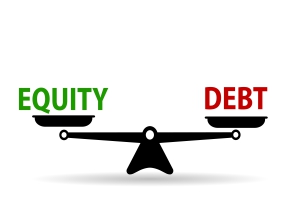As opposed to a single restaurant, a food court offers variety. It has something for each one. Likewise, as opposed to a single investment product, mutual funds have different types of schemes for different investors. Broadly, there are three types of mutual funds – equity mutual funds, debt mutual funds and hybrid mutual funds. Today, let’s understand and compare equity fund vs debt fund.
What are equity funds – Meaning explained
Equity mutual funds majorly invest in equities and equity-related instruments of different companies. These companies are spread across market capitalisations, sectors, themes, etc. Since these funds are associated with the ever-dynamic stock market, they are highly volatile. But at the same time, they have the potential to deliver inflation-adjusted returns in the long run and thus help you with capital appreciation and wealth creation.
What are debt funds – Meaning explained
Debt mutual funds invest in fixed-income instruments such as corporate bonds, treasury bills, certificates of deposit, commercial papers, etc. Since these securities have a fixed maturity and interest rate, debt funds are considered less volatile than equity funds. They may, thus, be suitable for you if you have a low risk appetite and are looking for capital protection in the investment world.
What is the difference between debt funds and equity funds?
The major difference between equity funds and debt funds lies in the securities that they invest in. This ultimately shapes their risk-return component. Equity funds tend to fall under the high risk-high return investment category whereas debt funds carry relatively low risks and offer low to moderate returns.
Equity funds and debt funds also differ in the way the gains therefrom are taxed. Short-term capital gains on debt funds are added to your income and taxed as per your income slab, whereas long-term capital gains are taxed at 20% with indexation benefits. Short-term capital gains on equity funds are taxed at 15%, whereas long-term capital gains are taxed at 10% with gains up to Rs. 1 lakh/year being tax-exempt.
Equity fund vs debt fund – Differences at a glance
|
Particulars |
Equity mutual fund |
Debt mutual fund |
|
Investments made in |
Stocks of different companies |
Securities that offer a fixed rate of interest |
|
Risk |
High risk |
Low risk |
|
Returns |
High returns |
Low to moderate returns |
|
Investment objective |
Capital generation |
Capital protection |
|
Investment duration |
Suitable for long durations generally over five years |
Suitable for short durations generally ranging from one day to three years |
|
Capital gains tax |
- Short-term capital gains are taxed at 15%
- Long-term capital gains in excess of Rs. 1 lakh/year are taxed at 10% |
Short-term capital gains are taxed as per your income tax slab
Long-term capital gains are taxed at 20% with indexation benefits |
|
Income tax benefit |
Can claim a tax deduction of up to Rs. 1.5 lakh in a financial year if you invest in Equity linked Savings Scheme (ELSS) |
No tax benefits available on debt funds |
|
Goals |
Suitable for long-terms goals such as retiring peacefully |
Suitable for short-term goals such as buying a phone |
|
Types |
ELSS, large-cap fund, flexi-cap fund, focused funds, etc. |
Overnight fund, liquid fund, money market fund, gilt fund, etc. |
To sum it up
You can opt for equity mutual funds if you want to create wealth in the long run and you have a high risk appetite. On the other hand, if you are a risk averse investor looking to invest in mutual funds for short-term goals, you can opt for debt mutual funds. With a deep understanding of equity fund vs debt fund, you can now better plan your investments.
An investor education initiative by Edelweiss Mutual Fund
All Mutual Fund Investors have to go through a onetime KYC process. Investor should deal only with Registered Mutual Fund (RMF). For more info on KYC, RMF and procedure to lodge/redress any complaints, visit - https://www.edelweissmf.com/kyc-norms
MUTUAL FUND INVESTMENTS ARE SUBJECT TO MARKET RISKS, READ ALL SCHEME RELATEDDOCUMENTS CAREFULLY.
Trending Articles
MUTUAL FUND INVESTMENTS ARE SUBJECT TO MARKET RISKS, READ ALL SCHEME RELATED DOCUMENTS CAREFULLY.




















